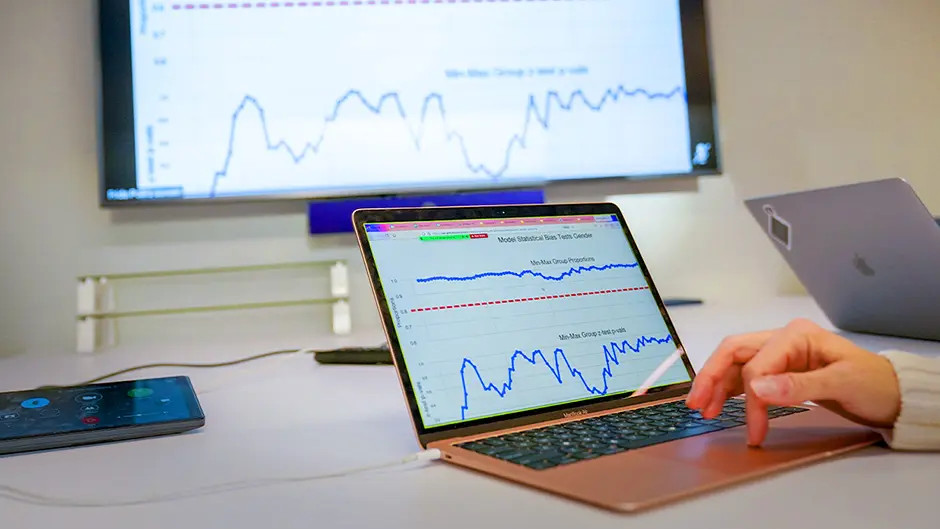
Celebrating literacy and making sense of data in the digital age
International Literacy Day, celebrated every Sept. 8 around the world since 1967, promotes literacy as a fundamental human right and pivotal factor in fostering compassion, peace, and lasting change.
The digital revolution, however, has reshaped this endeavor. The proliferation of data, often created by biased artificial generators, poses unique new challenges to the exercise of interpreting and making sense of information.
To help students meet this new challenge, the University of Miami School of Education and Human Development launched the Data Analytics and Intelligence for Social Impact (DAISI) degree program more than a year ago.

Soyeon Ahn, professor and program director of DAISI and senior vice dean of academic, faculty, and research affairs, and EllenMarie McPhillip, associate dean of undergraduate academic services, conceived the program from the premise that data encompasses nearly every aspect of our lives and should not be avoided.
“Many people think that data has to do with just numbers and math. Data is anything that has to do with information—it’s a logic, it’s a dialogue, it’s our life,” Ahn said. “Through the program, we’re empowering students to actively engage with this reality.”
Redefining literacy for the digital age
Literacy involves making sense of information and applying it to better our lives. In the digital era, this skill is more critical than ever, Ahn highlighted, noting that every day people use Alexa, cell phones, AI-powered tools, and a myriad of technological devices—all requiring a certain technological awareness.
Digital information is often biased, not only because of how algorithms are generated but because the rapid pace of development precludes shared guidelines to ensure fairness. These biases create an unprecedented challenge in terms of promoting literacy.
“People are trying to make sense of so much stimuli,” Ahn said. “Yet the information getting to them might be biased, minimally representative, or even a hallucination.”
The DAISI program does not prioritize teaching advanced quantitative or computational skills. Instead, it strives to empower students to use these skills critically to assess the information they receive, to make sense of it, and contextualize it to promote positive social impact. The program redefines data literacy as the ability to work with and understand all forms of data—from numbers and text to nonverbal cues such as eye contact or gestures. This holistic approach empowers students to assess a fuller picture of the data they receive.
Students in the program can build their curriculum with electives such as philosophy, language, psychology, sociology, or public health. They bring their own unique personal, cultural, and disciplinary knowledge and lived perspectives to the intergroup dialogue that takes place.
“Students are encouraged to bring their full selves—their cultural backgrounds and societal experiences to the table,” Ahn said. “They learn to see how their diverse perspectives, shaped by culture and society, directly influence how data is collected, analyzed, and contextualized.”
Ahn stresses to students the importance of critical thinking at every step of the data life cycle and likewise knowing what impact you want to make and on whom—a basic skill of literacy of any ilk.
“Yes, it’s a very basic concept, but not everyone knows it. Even for me, when I’m teaching statistics or any course, I must remember that if I don’t know my audience—the barriers that might be keeping them from learning—then I’m not connecting,” Ahn said. “To create social impact, you have to know who you are talking to, where they are coming from, and where are they heading.
“And this communication is not just verbal—it can be visual, oral, or written. You have to know your audience and think about how to make the data resonate,” she added. “Otherwise, there are no changes. There’s no impact.”
She emphasized, too, the importance of interdisciplinary collaboration, which requires compassion, open-mindedness, and active listening in terms of analyzing data.
“No one can know everything. You need to have people with different backgrounds, disciplines, and perspectives working together to make sense of data,” she said.
When developing algorithms, Ahn highlighted the value of having a range of different groups and voices participating so that the data generated is more representative. As an example, she cited the Chat Black GPT initiative.
Ahn’s prime motivation for the program has been to make data literacy accessible to everyone because it is no longer a specialized field but a necessity for modern life. She clarifies that the program values foundational skills and knowledge for data analytics, but its focus is on human-centered application and social impact.
“We value an understanding of numbers and math in our program and have students who love math,” Ahn said. “But what we truly care about is an individual’s curiosity, compassion, and ability to use knowledge to identify and address real-world problems.
“We’re looking for students who want to consciously generate more representative, less biased data and make sense of it to lead social change for individuals and communities,” Ahn said.

